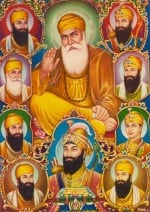Template:AOW77: Difference between revisions
Hari singh (talk | contribs) No edit summary |
Hari singh (talk | contribs) No edit summary |
||
| Line 1: | Line 1: | ||
[[Image:Tengurus.jpg|thumb|150px|right|<center>''The Ten Sikh Gurus''</center>]] | [[Image:Tengurus.jpg|thumb|150px|right|<center>''The Ten Sikh Gurus''</center>]] | ||
<big>'''[[Brief history of Sikhism]]:- '''</big> [[Sikhism]] was founded in the early fifteenth century by their founder teacher | <big>'''[[Brief history of Sikhism]]:- '''</big> [[Sikhism]] was founded in the early fifteenth century by their founder and spritual teacher called [[Guru Nanak]]. He was firmly of the belief that all people were born equal and should have equal opportunities. Guru means "spiritual leader" and he guided his people in the way of God's will or [[Hukam]] believing there was only one universal God and that we were all accountable to Him. There are over 20 million Sikhs worldwide and the religion is open to anyone. | ||
Guru Nanak was born in the village of [[Talwandi]], now called [[Nankana Sahib]], near [[Lahore]] in present-day [[Pakistan]]. His parents were of Hindu background and he belonged to the mercantile caste. Even as a boy, Nanak was fascinated by religion, and his desire to explore the mysteries of life eventually led him to leave home | Guru Nanak was born in the village of [[Talwandi]], now called [[Nankana Sahib]], near [[Lahore]] in present-day [[Pakistan]]. His parents were of Hindu background and he belonged to the mercantile caste. Even as a boy, Nanak was fascinated by religion, and his desire to explore the mysteries of life eventually led him to leave home and he travelled all over the world in the manner of [[India]]n saints. It was during this period that Nanak met many religious people and preached his message of one God to all the people of Central Asia. He made fivr distinct major journeys, which are called [[Udasis]] spanning many thousands of miles covering most of Central Asia and the Middle-East. <big>'''[[Brief history of Sikhism|... Continued.]]'''</big> | ||
Revision as of 22:46, 9 December 2006
Brief history of Sikhism:- Sikhism was founded in the early fifteenth century by their founder and spritual teacher called Guru Nanak. He was firmly of the belief that all people were born equal and should have equal opportunities. Guru means "spiritual leader" and he guided his people in the way of God's will or Hukam believing there was only one universal God and that we were all accountable to Him. There are over 20 million Sikhs worldwide and the religion is open to anyone.
Guru Nanak was born in the village of Talwandi, now called Nankana Sahib, near Lahore in present-day Pakistan. His parents were of Hindu background and he belonged to the mercantile caste. Even as a boy, Nanak was fascinated by religion, and his desire to explore the mysteries of life eventually led him to leave home and he travelled all over the world in the manner of Indian saints. It was during this period that Nanak met many religious people and preached his message of one God to all the people of Central Asia. He made fivr distinct major journeys, which are called Udasis spanning many thousands of miles covering most of Central Asia and the Middle-East. ... Continued.

